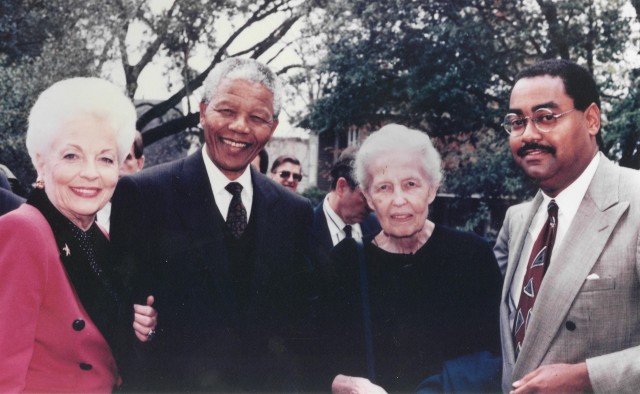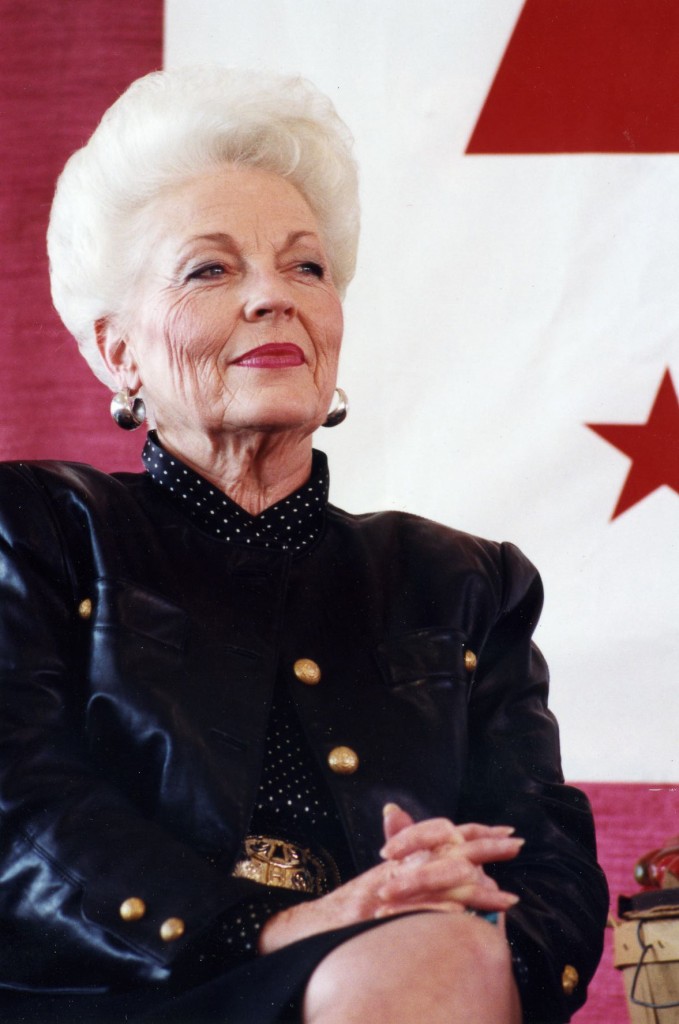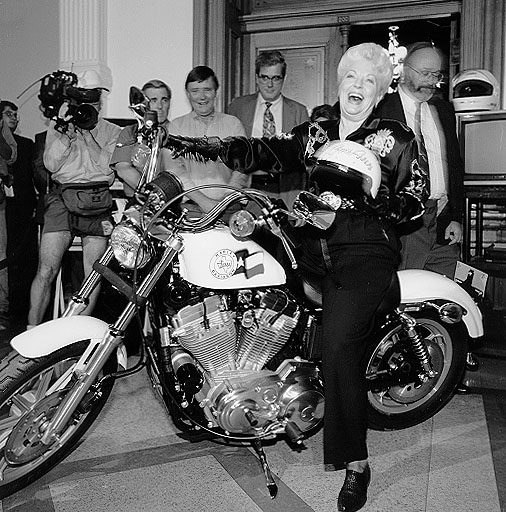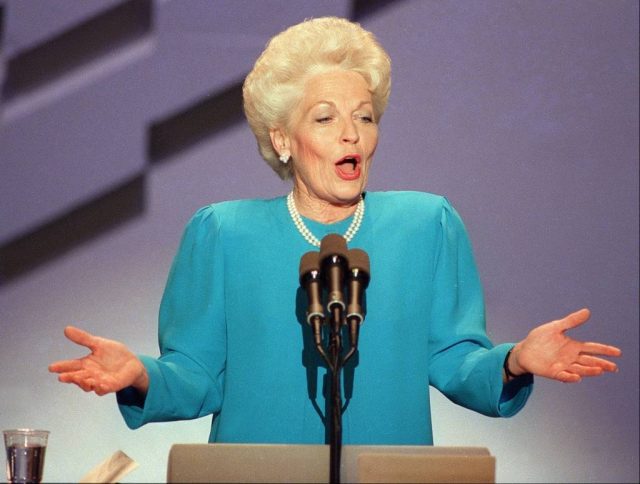EDITOR’S NOTE: A new HBO documentary, “All About Ann: Governor Richards of the Lone Star State,” takes a look back at the life of the political icon.
By Zachary Montz
“Good evening, ladies and gentlemen. Buenas noches, mis amigos! I am delighted to be here with you this evening, because after listening to George Bush all these years, I figured you needed to know what a real Texas accent sounds like.” This is how America first met Ann Richards, her trademark white hair lit by the spotlight as she delivered the keynote address at the 1988 Democratic National Convention in her distinctive Central Texas twang. Richards, then the state treasurer, poured it on that night, mixing a stalwart defense of activist government with swipes at the Republican nominee, fellow Texan George H.W. Bush, including her perfectly landed mocking line, “Poor George, he can’t help it – he was born with a silver foot in his mouth,” that brought the audience to its feet. Along with the jabs, Richards gave delegates the country wit and big personality they might have expected from a rising Texas politician. But here, too, was something new from a state famous for its macho self-image: a woman, and a proud, sharp-tongued liberal at that. The fiery speech won the hearts of delegates, prompting some to wonder if the Democrats had nominated the wrong person. Ann Richards had become a national star.
Richards’s keynote provides the opening for HBO’s recently-premiered documentary “All About Ann: Governor Richards of the Lone Star State,” which airs on the cable network throughout May, as well as on HBOGo. An opportunity for longer-settled Texans (and non-citizens too) to revisit the life and career of the woman who rose to the top of the state’s conservative and male-dominated political scene, this excellent documentary also serves to introduce Richards to a new generation, who know a Texas where the politics have gone from conservative to right-wing and are almost as single-gender as they were when Richards was elected governor in 1990.
Originally released in 2012, this product of first-time documentarians Jack Lofton and Keith Patterson, was subsequently acquired by HBO’s documentary division, which recut the film to tighten its focus on Richards’ career in statewide office, from her election as State Treasurer in 1982 to her gubernatorial loss to George W. Bush in 1994. While “All About Ann” features commentary from Bill Clinton, Michael Dukakis, Dan Rather and other national figures, some of the best insights come from interviews with Richards’ inner circle of advisors, namely long-time chief of staff Mary Beth Rogers and speechwriter Suzanne Coleman. Contributions from Richards’ former husband David and from her children, including daughter Cecile, now a Democratic political player and Planned Parenthood president, give viewers a look at Richards’ time both before and after her stint in big-league politics and provide a sense of how the many sides of her well-known personal life – as a mother, grandmother, teacher, divorcee, and recovering alcoholic – helped shape her political outlook and public persona.
Of course, there is no substitute for the woman herself, and the film is wise to let Richards, who died in 2006, tell much of her own story. The directors take advantage of archival newsreel, interviews, and televised debates and speeches to show the full depth of Richards’ character, her knack for language, and the prodigious communication skills (one thing we learn is that Richards’ mother enrolled her in “expression lessons” as a child) that took her to the Governor’s Mansion.
Viewers get only a quick run through Richards’ life before elected office: her upbringing in Waco and high school debating triumphs, her marriage in college to David Richards, who would become a prominent labor and voting rights lawyer, and her time raising four children in Dallas and later Austin. As she explains it, a career in politics was not something she had initially considered. “I was exactly what the magazines said I ought to be,” Richards recalled, “I was a hostess, a fabulous cook, a chauffer, [and] I was very involved with my kids.” Richards had been involved on the outside of politics, doing the “women’s jobs” of social planner and campaign volunteer, but when David passed on a chance to run for a seat on the Travis County Commissioners court in 1976, Ann jumped into the game, winning election in her first race. Richard worried that the dramatic shift in her life and the new role she would play in her family would spell trouble for her marriage. She was right. Although they remained on generally good terms, the couple split in 1980 and divorced in 1984.
It was around the same time that Richards went through treatment for alcohol addiction. Richards’ personal life was the subject of many a dirty political attack during her career, the most common of which were that she had fallen off the wagon or that she was bisexual. In the 1990 Democratic gubernatorial primary Richards was dogged by Attorney General Jim Maddox’s frequent allegations of past cocaine use. Richards skillfully dodged the question, turning it into an opportunity to talk frankly with voters about overcoming her alcohol problem. Not that Richards couldn’t play rough too. In the same race she put away former Governor Mark White with ads that implied – with no real proof – that he had been paid to steer state business to a Houston bond firm.
Watching Richards counterpunch her way to victory in a good, old fashioned Texas melee like the ’90 primary is a delight for the political junkie, but it would be a mistake to let Richards’ campaigning talents distract from what was at the heart of Richard’s political story: her desire, as she put it, to create a “new Texas,” one where the “doors of government” would “swing open” to “let the people in.” As the documentary makes clear, this purpose was present from the beginning of Richards’ entry into public service, and the film gives considerable attention to her tenure as State Treasurer, where Richards earned acclaim for reforming an office that was a bastion of good-old-boy inefficiency when she took over in 1983. Richards modernized the Treasury, both by computerizing its workings and by emphasizing the hiring of minorities and women in an effort to make the government of Texas better reflect the state’s diverse population.
In the debates over hiring and affirmative action in the 1980s, many conservatives argued that measures to create diverse workforces would come at the expense of job performance. Excellence and diversity were counterpoised values. Richards had no need to play that game. “They told me that I was asking the impossible, that I simply could not find Hispanics and blacks and women who were capable… of really high-class financial management,” Richards recalled in 1991. But her success in the Treasury, she argued, “has been directly the result of opening the door and giving an opportunity to people who were dying to prove themselves.” In Ann Richards’ new Texas, diversity and excellence went hand in hand. And one only had to look at other areas of Texas government to know that the opposite was also true: a closed door, and the old boys network that thrived behind it, could be a recipe for incompetence and corruption.
Richards’ commitment to diversity and her vision of an open government, among other convictions, put her in the left-liberal wing of the Texas Democratic Party, an outsider compared to the so-called pragmatic or conservative Democrats who continued in the tradition of LBJ and John Connally. Texas liberals had rarely been in the driver’s seat of their own party, never mind in the Governor’s Mansion, and given the state’s current domination by Republicans, it is worth asking how Richards ever managed her upset victory in 1990. Certainly her opponent had something to do with it. That year, the Republicans nominated Clayton Williams, a man who seemed to be made in their own self-image: a wealthy businessman, a rancher, and a straight-shooter. What they got was a political fool who shot himself in the foot enough times to blow an early double digit lead. The documentary airs the full “Claytie” blooper reel. It would be pure comedy if Williams’s attitude towards women didn’t seem so out of our present political moment: a disgusting rape “joke,” a comment about Richards that he would “head her and hoof her and drag her through the dirt,” and a decision (a premeditated one, as the film reveals) to refuse to shake his opponent’s hand after a televised debate.
Ironically, it is the clownish version of Williams that conservatives like to remember, for it allows them to write off Richards as an accidental governor, one who won only by dint of her pitiful opponent. But as several of Richard’s former staffers point out in “All About Ann,” it wasn’t only the misogyny that undid Williams. The margin of victory came from working class voters, especially in East Texas – a generally-conservative group, but one with a populist streak. Richards could out-good-ole-boy the good-ole-boys and could poke fun at Texas’s bubbas while winning their vote, and her campaign coupled her personal touch with a concerted effort to portray Williams as a big businessman unconcerned with working Texans. Williams’ steadfast refusal to release his tax returns, and his out-of-the-blue admission in the campaign’s final week that he had paid no taxes during the crash year of 1986, helped Richards rack up votes in East Texas, sealing the election for her.

From left: Texas Governor Ann Richards, Nelson Mandela, Dominique de Menil, and Texas State Senator Rodney Ellis, 1991 (Senator Rodney Ellis/Wikipedia)
Richards began her governorship ready to “make changes that should have been made a long time ago.” Continuing her record as treasurer, she appointed an even split of men and women in her first 100 days. The officials reflected the diverse state: 54% were white, 25% Hispanic, and 21% black. The film provides a laudatory overview of Richards’ term. She threw out rubber-stamp regulators in the insurance department, passed a new ethics law, put teeth into seldom-enforced environmental rules, and implemented an addiction treatment program in state prisons to reduce recidivism, all broadly popular moves that kept her personal approval ratings high and grew her national profile.
This approving account of Richards’ time in office provides little sense of her shortcomings, and notably excludes mention of struggles involving the budget and school finance. The oversight is compounded by the directors’ failure to include any interviews with either critics or opponents of the former Governor. As a result, “All About Ann” is hard pressed to explain just how Richards, despite her personal popularity, lost decisively to George W. Bush in 1994. The film provides two culprits: Karl Rove, a political consultant made uniquely powerful by a lack of scruples, and an election cycle unusually hostile to Democrats. The film puts Rove behind rumors that Richards’ supposed legions of gay supporters were poised to spread their “lifestyle” through the public schools, and a whisper campaign about gun confiscation, an effective, if unoriginal, charge that was bolstered by Richards’ veto of concealed carry legislation. Meanwhile, Bush – a likeable, attractive, and disciplined campaigner – could play it straight, avoiding the personal attacks and mistakes that destroyed his Republican predecessor. Although he criticized Richards for being soft on crime and presented his own ideas about education reform, Bush ran against Bill Clinton as much as the sitting Governor, attacking an unpopular president in a midterm year that would give Republicans control of Congress.
Just as the idea of Richards as an accidental governor denies her ground-breaking victory, the story presented by her allies that she was felled by forces beyond her control denies Richards’ role in her own defeat. As Jan Reid argues in his sympathetic, but by no means uncritical, 2012 biography of Richards, the Governor’s term can be seen as a parabola: real successes in the first two years were followed by a decline in the latter two. Richards divided her time and energy between governing in Austin and involvement in the national scene, leaving her without a clear program and on the defensive against a rising tide of Republican attacks. In 1990 Richards had been the brassy outsider. Four years later, lacking a bold policy agenda to match her personality, she was open to being defined by her enemies and vulnerable to the sorts of attacks – guns, God and gays – that Rove and Co. used to great effect. Her campaign centered on the complaint that Bush was a spoiled novice whose only qualification for the Governorship was that he thought he was entitled to it. She couldn’t convince enough Texas voters that he was not.
Richards would find plenty to do after leaving the Governor’s Mansion. She had no interest in running for another elected office, telling the public after her loss that “I’ve been doing this for 18 years – not as long as I was a housewife – and now I look forward to something new.” The documentary shows the many roles she played: as a lobbyist and strategist, lecturer, stump speaker for female Democratic candidates, and as a fantastic talk show guest. All throughout she continued her fight on behalf of the causes she had advanced during her political career, especially the rights of women to control their own bodies, right up until her death from esophageal cancer in 2006.
The release of “All About Ann” comes as another Texas woman, the first, in fact, since Richards, has received the Democratic gubernatorial nod, and comparisons between the two are inevitable. Like Ann Richards, Wendy Davis has captured national attention and built a dedicated base among Texas women at a time when reproductive rights are at the forefront of political conversation. Unlike Richards, however, Davis faces a Republican Party that is much more dug in, and her opponent, Greg Abbott, while perhaps not having the personal likability of George W. Bush or Rick Perry’s deep understanding of the right wing id, is no Clayton Williams. And outside of her core supporters, Davis has yet to show that she can connect with Texas voters in the way that Richards did in 1990.
But “All About Ann” reminds viewers that Richards too faced an uphill battle when she declared her candidacy for the governorship. It was against these long odds when she was at her fighting best. The documentary closes with a poignant clip of Richards speaking at a LGBT fundraiser in 2003, coughing her way through a powerful address, already suffering from failing health. Recalling the many barriers to women and minorities that had fallen in her lifetime, Richards encouraged her audience to continue the effort to create the sort of “pluralistic society where human dignity is cherished” that had been at the heart of her political life. “We have got to remember that we have the power… that dreams can come true if we are willing to work for them.” It has been the mantra of Texas liberals in the many fights they lost in Ann Richards’ lifetime, and in the few that were won.
Zachary Montz received his PhD in History from UT Austin in 2014
Sources:
Some background information on Richards’ term as Governor, as well as demographic information on her appointees, is drawn from Jan Reid’s excellent biography, Let the People In: The Life and Times of Ann Richards (University of Texas Press, 2012)







